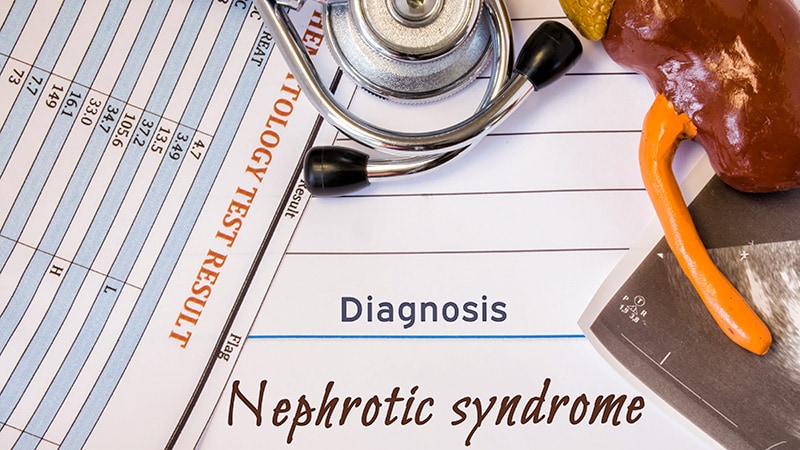STOCKHOLM — People with difficult to diagnose kidney diseases linked to nephrotic syndrome show uniquely high levels of antinephrin autoantibodies, suggesting a novel biomarker and breakthrough development in diagnosing and managing the diseases.
“The discovery of antinephrin autoantibodies thoroughly changes our understanding of idiopathic nephrotic syndrome, minimal change disease (MCD), and primary focal segmental glomerulosclerosis (FSGS), which classify as antinephrin-associated podocytopathies in many cases,” co-author Nicola Martin Tomas, MD, University Medical Center Hamburg-Eppendorf, Hamburg, Germany, told Medscape Medical News.
“It offers an explanation for affected antinephrin-positive patients to understand what they are suffering from, voiding the ‘idiopathic’ character of the disease,” he said.
The study was presented on May 25 at the 61st European Renal Association (ERA) Congress 2024 and simultaneously published in the New England Journal of Medicine.
Nephrotic syndrome, characterized by elevations of protein in the urine that can potentially lead to infection and blood clots, can be caused by MCD and primary FSGS in adults, and by idiopathic nephrotic syndrome in children.
Diagnosing these conditions can be challenging due to overlapping symptoms and histologic features. The cause can typically be determined with a kidney biopsy, however, few patients undergo that option, particularly younger patients, underscoring the need for a biomarker.
Previous studies have indicated that patients with MCD have autoantibodies targeting nephrin, however, with their clinical significance unclear, the authors sought to further investigate in the current multicenter study.
For the trial, they enrolled 357 patients in the United States and Europe with MCD and FSGS, as well as other glomerular diseases, including membranous nephropathy, IgA nephropathy, antineutrophil cytoplasmic antibody-associated glomerulonephritis, or lupus nephritis.
In addition, 182 children with idiopathic nephrotic syndrome were enrolled, as well as a control group of 117 participants.
Among 105 adults with MCD, antinephrin autoantibodies were detected in 46 (44%), and among 74 adults with FSGS, autoantibodies were detected in 7 (9%).
Importantly, antinephrin autoantibodies were rarely detected in the other conditions.
Among 182 children with idiopathic nephrotic syndrome, autoantibodies were found in 94 (52%).
In a subgroup of immunosuppression-naive patients with active MCD and idiopathic nephrotic syndrome, the prevalence of antinephrin autoantibodies was as high as 69% and 90%, respectively.
“Immunosuppressive therapy may quickly decrease antinephrin antibody levels in the blood. Therefore, the proportion of antinephrin positivity is higher if immunosuppression was not yet started,” Tomas explained.
Of note, at baseline and follow-up, antinephrin autoantibody levels correlated with disease activity, underscoring their potential as a biomarker indicating disease progression.
To further investigate the potential effects of nephrin immunization, the authors conducted studies on mice models that mimicked MCD, and importantly, they found that single nephrin immunization led to swift disease resolution, even at low antibody concentrations.
Novel Hybrid Detection Technique
Although previous studies have suggested the presence of antinephrin autoantibodies, “the difficulty has been in the detection,” co-author Tobias B. Huber, MD, also of the University Medical Center Hamburg-Eppendorf, explained while presenting the study.
“Even with enhanced assays, we couldn’t see a robust signal for antinephrin autoantibodies,” he continued.
As a solution, they developed a novel hybrid detection technique, combining immunoprecipitation with a nephrin ELISA, which allowed for quantitative measurement of antinephrin autoantibody levels.
“Such antibody quantification can potentially transform the management of nephrotic syndromes by providing noninvasive alternatives for diagnosis, enhancing treatment evaluation, and improving kidney-transplantation strategies in patients with recurrent primary FSGS,” the authors explain.
They argue that the strong correlation between disease activity and the detection of antinephrin autoantibodies, in addition to the specificity of the autoantibodies in glomerular diseases, “suggests that these antibodies are not merely a by-product of podocyte damage but play a causal role in the pathobiologic characteristics of the disease.”
“Depending on future studies, antinephrin autoantibodies might help to prognosticate patients’ risk for different disease courses, guide therapy decisions, and ultimately even set the ground for the development of specific antibody-targeted therapies to avoid side effects of the broad immunosuppression, which is yet the standard of care,” Tomas added.
Commenting for Medscape Medical News, Ivan Rychlik, MD, PhD, Department of Medicine, Charles University, Prague, Czech Republic, said the study has important implications.
“[The study] certainly is of interest for clinical nephrologists since it brings a novelty in understanding the pathophysiology of nephrotic syndrome caused by immune-mediated podocytopathies,” said Rychlik, who comoderated the session.
In addition to the insights of an important correlation of the antinephrin autoantibodies, the significant correlation with disease activity throughout the entire study period is a benefit,” Rychlik said.
“The additional value is the early proof of correct diagnosis, which for sure would have positive consequences both from the side of the patient and treating physician,” he added.
“Further, it brings new hope to our patients who suffer from these diseases.”
Huber has disclosed relationships with Alexion Pharmaceuticals, Amicus Therapeutics, AstraZeneca, Bayer, Boehringer Ingelheim, German Federal Ministry of Education and Research, Da Vita, German Research Foundation, Euroimmun, Novartis, Pfizer, Renovate, Sanofi, Travere Therapeutics, and Vifor Fresenius Medical Care Renal Pharma. Tomas has disclosed relationships with AstraZeneca and the German Research Foundation. Rychlik has reported no relevant financial relationships.

Rohit Malhotra is a medical expert and health journalist who offers evidence-based advice on fitness, nutrition, and mental well-being. His articles aim to help readers lead healthier lives.


